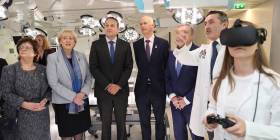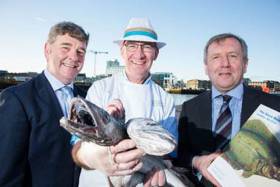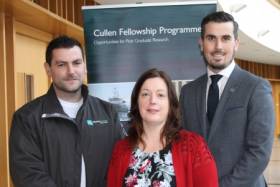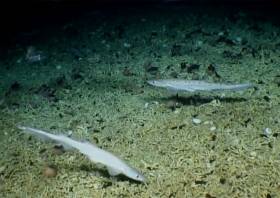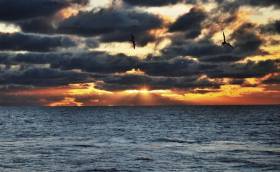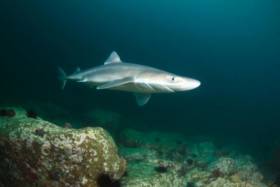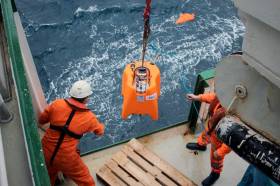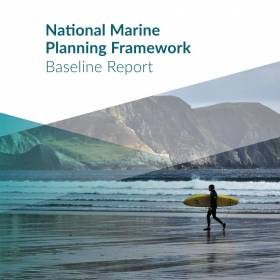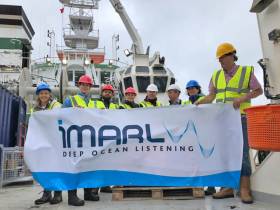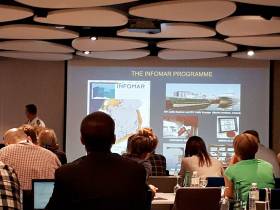Displaying items by tag: Marine Institute
€5M For Marine & Agri-Food Projects Under Disruptive Technologies Innovation Fund
Marine Minister Creed has welcomed the announcement of over €5 million in funding for marine and agri-food projects under the Government’s Disruptive Technologies Innovation Fund.
The inaugural funding call, announced yesterday (Monday 10 December) by Taoiseach Leo Varadkar and Innovation Minister Heather Humphreys, will see Ireland’s leading research performing organisations including the Marine Institute, Teagasc, universities and institutes of higher education share in the €75 million funding pot along with successful agri-food and marine companies.
Minister Creed said: “This is a huge boost for the agri-food and marine sector and highlights the innovation potential that exists in our SMEs and research-performing organisations, particularly when working together in close collaboration.
“I would like to take this opportunity to congratulate the applicants on their success in what was a highly competitive funding call.”
Minister Creed added that he recognised the “importance and significant role” the agri-food and marine sector “plays in maintaining rural economies and communities”.
“I have been particularly encouraged by the participation and success of rural-based SMEs under this call. These industries are vital to the economic stability of the country as a whole and the opportunity for SMEs to collaborate with some of our leading academic institutions will be of enormous benefit in the safeguarding and future growth of the economy, jobs and rural communities.”
Among the total of 27 projects that will received funding in this inaugural round are three with a marine focus.
HYDRO-fish — a consortium including NUI Galway, Bio-Marine Ingredients Ireland, Teagasc and the Marine Institute — will received €2 million over three years to combine targeted nutraceuticals and traceability technology for a smarter and sustainable Irish fish aquaculture industry.
HYDRO-fish is a multi-disciplinary research programme, specifically designed to employ current technologies from other sectors to disrupt and enhance current fish farming practices. The project entails reinforcing the supply chain of Irish salmon production, in particular for organic salmon farming.
In Cork, Allihies Seafood, Carbery Group and the University of Limerick will receive €1.8 million over the same period for the optimised commercial-scale cultivation of protein-rich biomass from Palmaria palmata.
This project aims to sustainably generate plant-based proteinaceous ingredients for exploitation as a source of high-quality protein and contribute to meeting the growing global demand for plant-based protein for animal and human consumption.
And in Dublin, Techworks Marine Ltd and DCU will get €1.1 million towards developing an advanced environmental decision support system for coastal areas.
This project will address issues such as coastal pollution and flooding. Such a system will provide enhanced insights to coastal industries, local authorities, government agencies and will ultimately benefit Irish society.
Marine Institute Fish Stock Book 2018 Received by Minister
The Minister for Agriculture, Food and the Marine, Michael Creed, T.D., has received the 2018 Marine Institute Annual Stock Book. The Stock Book, which is one of the principal annual publications of the Institute, provides the latest impartial scientific advice on commercially exploited fish stocks of interest to Ireland. The Stock Book is used by the Department of Agriculture, Food and the Marine at the annual fisheries quota negotiations with the EU in December of each year and throughout the year at fisheries management meetings. The publication provides the latest scientific advice for fish stocks of interest to Ireland.
Minister Creed said, “The fishing industry is a vital part of Ireland's ocean economy. In 2018, the Irish fishing fleet has had access to quotas of 215,765 tonnes of fish, with an estimated landed value of over €266 million euro. The information presented by the Marine Institute in the Stock Book is critical to the preparations for the annual Fisheries Council quota negotiations which will take place in Brussels on the 17th & 18th of December. The detailed stock-by-stock guide ensures we have the most up-to-date scientific advice on this renewable resource.”
The annual Stock Book contains an overview of all fisheries. The process for its compilation involves the Marine Institute meeting with industry and NGOs each quarter to discuss the results from the scientific programmes and the developing scientific advice. This information is also utilised in the overall sustainability assessment, which Minister Creed presents to the Oireachtas on an annual basis. The Stock Book, which has been published by the Marine Institute since 1993, is the primary reference text utilised by the Department of Agriculture, Food and the Marine in preparation for annual quota negotiations with the EU, in December of each year. Throughout the year, the Stock Book also serves as a valuable reference guide to a wide audience, including the fishing industry, managers, marine scientists, environmental NGOs, third level institutes and financial institutions. It is also of interest in the status and management of marine fisheries resources in the waters around Ireland.
Dr Peter Heffernan, Marine Institute CEO, said; “The seas around Ireland are among the most productive and biologically sensitive areas in EU waters. The Marine Institute conduct comprehensive and broad science programmes in order to sustainably monitor and develop this valuable resource. Fisheries scientists collectively spend over 1000 scientific days each year at sea on the Institutes two research vessels, RV Celtic Explorer and the RV Celtic Voyager, surveying these fish stocks and their habitats. The scientific advice and services provided by our scientists to stakeholders is a key focus of our Strategic Plan 2018- 2022. These scientific services are essential to supporting a sustainable ocean economy, protecting and managing our marine ecosystems and meeting EU obligations. As part of the services provided, our scientists also participate in, and lead, international working groups that assess fish stocks and provide scientific advice on how many fish can be safely removed from this renewable resource. This is essential in sustaining our ocean economy for our coastal communities,”
The Stock Book is available electronically as a PDF and as an interactive document on the Marine Institute's here
Much of the scientific work that delivers the Stock Book is funded under the European Maritime Fisheries Fund scheme.
This year’s Stock Book was dedicated to the memory of Mr Joey Murrin and Mr Richie Flynn, R.I.P, who both passed away in 2018, in recognition of their leadership in the Irish seafood sector. Both men served on the Marine Institute Board providing expert advice and advocating the importance of the fishing industry for Ireland’s coastal communities.
Importance Of ‘Blue Economy’ Skills Highlighted At Cullen Fellowship Meeting
Nineteen postgraduates presented their marine research highlighting the innovation and contributions being made towards the growth of the marine sector in Ireland at the Cullen Fellowship Programme’s two-day annual meeting last week.
Dr Peter Heffernan, chief executive of the Marine Institute which hosted the meeting in Oranmore, had particular praise for Philip Stephens of NUI Galway and James Fahy of University College Dublin, who recently completed their respective Master’s degrees in Science.
“The graduates and other Fellows’ high level of accomplishments are welcomed in Ireland, particularly when the ocean sector is one of the fastest areas of economic growth, outpacing progress in the general economy in recent years,” Dr Heffernan said.
The Cullen Fellowship Programme has provided grant aid to the value of €1.9 million supporting 24 PhD and three Master’s students in their research over the last four years.
This has involved 15 research themes identified in the National Marine Research & Innovation Strategy 2017-2021, ranging from marine technology and fisheries management to oceanographic research, aquaculture, fish health, food safety, seabed mapping, marine technology, shipping and maritime transport, marine environment, marine economics, law and policy, education and outreach.
“We are extremely pleased with the high calibre of skilled marine researchers that have been involved with the Cullen Fellowship in recent years,” said Martina Maloney of the Marine Institute’s research funding office.
“The opportunities that the students have gained has helped further support the Government’s national Harnessing Our Ocean Wealth strategy in developing a thriving maritime economy, building healthy marine ecosystems and creating engagement with the sea.”
The growth of Ireland’s ocean economy in 2017 had a direct impact of €5.5bn turnover employing over 32,000 people. The Government investment in the ocean economy is on track to double the value of Our Ocean Wealth to 2.4% of GDP by 2030.
“We are reliant on the ocean for its food through fisheries and aquaculture, ocean transport involving shipping and tourism as well as the societal impact the ocean provides us,” Dr Heffernan said.
“Therefore, with the trend in changing economies, new forms of energy, transport and food production transforming industries, companies and jobs in the near future, it is important that we continue to invest in third level research for our next generation of marine scientists and researchers.”
The Marine Institute set up the Cullen Fellowship programme in 2014 in memory of Anne Cullen (1958-2013), who had made a significant contribution to the work of the Marine Institute over 35 years, inspiring many students through the Institute's bursary programme, encouraging students to get hands-on experience to support their study.
The Cullen Fellowships are carried out with the support of the Marine Institute and funded under the Marine Research Programme by the Government.
Cullen Fellowship opportunities will be advertised as they arise on www.marine.ie under ‘Research and Funding – Current Funding Opportunities’ and through various social media channels.
Find Out More About Ireland’s Rare Shark Nursery At Galway Science and Technology Exhibition This Sunday
Members of the Marine Institute, INFOMAR and Explorers Education teams, as well as the chief scientist of the SeaRover survey, will be at the Galway Science and Technology Festival this Sunday (25 November) highlighting the recent discovery of a rare shark nursery in deep waters off the West of Ireland.
The shark-themed stand — All About Sharks, Sharks and More Sharks — will also provide children and their families an insight into the life of a marine scientist, what seabed mapping involves and how this led to the discovery of the shark nursery.
“It was incredible, real David Attenborough stuff,” David O'Sullivan, chief scientist for the SeaRover survey, told the Guardian. “This is a major biological find and a story of this magnitude would have been on Blue Planet if they'd known about it. Very, very little is known on a global scale about deep-sea shark nurseries.”
The SeaRover suvey, using the Marine Institute’s remotely operated vehicle (ROV) Holland 1 onboard the ILV Granuaile, took place during the summer 2018 off the Irish coast.
And its findings show the significance of documenting sensitive marine habitats, which will assist in a better understanding of the biology of these animals and their ecosystem function in Ireland’s Biologically Sensitive Area.
If you’re interested in learning more about the discovery of the sailfin sharks, you will find the experts at the back of the Bailey Allen Hall at NUI Galway from 10am to 6pm. Entry is free of charge and open to the public.
Marine Institute Welcomes Irish Commitments To Ocean Research
The Marine Institute has welcomed Irish commitments announced at the recent Our Ocean Conference in Bali which include the provision of €25 million for a 50-metre modern research vessel to replace the RV Celtic Voyager.
“The vessel will provide critical national infrastructure to enable Ireland to address the considerable challenges of Brexit and the Common Fisheries Policy as well as climate-induced impacts on our oceans,” Marine Institute chief executive Dr Peter Heffernan said.
In addition, the Marine Institute says it has committed €2 million towards a new five-year programme of ocean and climate research.
With 50% funding from the EU ERDF scheme, the Marine Institute is running a competitive funding call to support the establishment of a principal investigator-led research team in an Irish higher education iSnstitution.
“This is a key investment to build capacity in an area of research prioritised under the National Marine Research and Innovation Strategy (2017-2021),” Dr Heffernan said.
“The research funded under this programme will deliver societally relevant knowledge aimed at better understanding the complex interactions between the ocean and climate change.”
Minister Creed also announced the continued commitment to the Environmental Educational module of Ireland’s Green Schools programme, and the continued support of the Clean Coasts programme.
“These programmes aim to build on Ireland’s marine and maritime heritage by increasing awareness of the value, opportunities and social benefits of our ocean wealth and identity, further supporting the Marine Institute’s Explorers Education Programme,” Dr Heffernan said.
Other announcements by Ireland include the provision of €10m to the local authority sector in Ireland to aid in the establishment of four Climate Action Regional Offices (CAROs) and €1m over a five-year period (2019-2024) towards a new programme of ocean and climate research.
The Marine Institute also welcomes commitments announced by the European Commission which include €300 million for EU-funded initiatives for projects to tackle plastic pollution, make the ‘blue economy’ more sustainable and improve research and marine surveillance.
Galway Meeting Highlights Importance Of Ocean Observation In Europe
#MarineScience - More than 70 leading marine scientists from across Europe met in Galway recently to discuss open access to research on ocean observation.
The Marine Institute in Oranmore hosted the second general assembly of the EU-funded Jerico-NEXT Project, which aims to build on the ongoing co-operation of coastal observatories in Europe — such as SmartBay in Galway — for wider application by the research community and society alike.
A fundamental tenet of the project is that coastal areas are the “most productive and dynamic environment” in the world’s oceans, according to the institute, with significant potential for renewable energy in particular.
“The Marine Institute has a longstanding commitment to the collection, processing and analysis of high quality coastal marine observations,” said the institute’s Paul Gaughan.
“In Ireland we are utilising the SmartBay coastal observatory, located 5km off Spiddal in Galway Bay, as a key component in this trans-European collaboration effort.
“From this we are able to deliver high quality information about sea conditions, subsea video and audio data in real-time to scientists around Europe to access and analyse.”
Data from the SmartBay site are freely available online.
The Marine Institute also recently hosted a delegation of officials from Kenya as part of the Memorandum of Understanding signed last year with the Kenyan Marine Fisheries Research Institute (KMFRI).
The official visit focused on developing an action plan around seven priority areas outlined in the MoU, which include plans for marine fisheries management, hydro-acoustics and assessment of pelagic fisheries resources.
Other priorities are spatial analysis and mapping of vessel monitoring system (VMS) data, integration of VMS and logbook data for fisheries management, and a data management strategy.
Opportunities for exchange, study visits and developing joint PhD and post-doctoral research projects were also a focus of discussions.
Schools Encouraged To Engage With Science On New Atlantic Ocean Seismic Mission
#MarineScience - The new mission to Ireland’s offshore reaches to monitor seismic activity on the North Atlantic floor is to engage with schools while at sea.
As previously covered on Afloat.ie, scientists from the Dublin Institute for Advances Studies (DIAS) departed last Monday 17 September, on board the RV Celtic Explorer, for the three-week voyage that will see them deploy a network of 18 seismometers as part of the SEA-SEIS project.
Daniel Farrell is reporting on their work via the RV Celtic Explorer’s blog Scientists@Sea.
“I am looking forward to sharing first-hand what it’s like being on a research vessel such as the RV Celtic Explorer,” says Farrell, of CoastMonkey.ie and sponsored by DIAS and the Marine Institute.
“I have a passion for the sea, and will be filming the scientists, writing content for the blog as well as taking photos of all of the activities where everyone can keep up to date with what is happening.”
Students and teachers can engage with the mission through Farrell’s blog posts as well as with a range of resources and videos available on the SEA-SEIS website.
“The SEA-SEIS team have also organised a range of activities that both primary and secondary schools can take part in over the next couple of months,” Farrell adds.
“There are teaching resources and lesson plans from the Explorers Education Programme, as well as some great competitions involving a drawing competition and composing a rap song.”
Public Invited To Have Their Say On National Marine Planning Framework Report
#OurOceanWealth - A new report aims to brings together a clear picture of all activity in Ireland’s seas for the first time.
Published yesterday (Tuesday 18 September), the National Marine Planning Framework Baseline Report has been branded “a key part of the process of developing Ireland’s first marine spatial plan”, which is intended to be the marine equivalent of the National Planning Framework.
The report sets out the context in which the marine plan is being developed in order to identify the key issues to address via consultation or discussion with various stakeholders, whose responses will inform the first draft framework to be published in mid 2019.
Representatives from all key sectors — fisheries, aquaculture, energy, tourism, sport, local authorities and environmental NGOs — comprise an advisory group overseeing the process.
Speaking on the Baseline Report, Damien English, Minister of State at the Department of Housing, Planning and Local Government with responsibility for marine planning, said: “When we see the demands being placed on our marine area clearly laid out, we can effectively consider whether those demands can be met simultaneously or whether some management or governance is required in particular areas.
“As we move further along the process of plan-making, the report, and your feedback on it, will play a critical part in the examining of potential synergies and co-existences, facilitating conflict resolution, anticipating future spatial needs and balancing the ecological, economic and social elements of the marine in a sustainable fashion.”
Developed with assistance from the Marine Institute, the report is available online and the public are invited to make submissions on it until noon on Friday 14 December.
A series of regional panel events discussing the report will be held shortly in Waterford (Tuesday 2 October), Galway (Friday 5 October), Sligo (Friday 12 October), Cork (Friday 19 October) and Dublin (Tuesday 23 October).
New Project To Uncover Secrets Of Ireland’s Offshore Ocean Floor
#MarineScience - Researchers from the Dublin Institute for Advances Studies (DIAS) departed Cobh yesterday (Monday 17 September) on the RV Celtic Explorer with a mission to monitor seismic activity on the North Atlantic Ocean floor.
As Silicon Republic reports, the SEA-SEIS project will deploy 18 seismometers over the next three weeks to form a network that will cover Ireland’s offshore area.
These sensors will collect data over the next two years, measuring tiny vibrations from seismic and ocean waves that will inform 3D models to unveil the mysteries below the sea bed.
DIAS is partnering with the Marine Institute, Geological Survey of Ireland, Science Foundation Ireland and Irish Centre for Research in Applied Geosciences (iCRAG) on the SEA-SEIS mission that will use acoustic sensors developed by the iMARL deep ocean listening project.
“The geological evolution of Ireland’s offshore territory is fascinating, but there is still so much of it to be explored,” said Prof Chris Bean, a specialist in geophysics at DIAS.
He added the SEA-SEIS project means that for the first time “we will be able to make long-term direct observations of the interactions between our oceans and solid Earth in this region.”
Silicon Republic has more on the story HERE.
Big Presence For INFOMAR At Major Seabed Mapping Conference
#MarineScience - The extensive work carried out jointly by the Marine Institute and Geological Survey Ireland through the INFOMAR programme received substantial exposure and recognition at the 16th Forum for the Exchange of Mutual Multibeam Experiences (FEMME) in Bordeaux last week.
Hosted by the Kongsberg Maritime User Forum and focussing on seabed mapping, FEMME provides an international platform for hydrographic professionals to meet, exchange experiences and ideas, provide inspiration and contribute to improved system performance and the future of underwater mapping technologies.
High-profile attendees include the secretary general of the International Hydrographic Organization (IHO), chief hydrographers from the Service Hydrographique et Océanographique de la Marine (SHOM), and Seabed 2030 leaders.
An overview of the Department of Communications, Climate Action and Environment-funded INFOMAR programme was provided by Dr Fabio Sacchetti, who updated the audience on future plans as well as recent achievements of the Irish national seabed mapping initiative.
Dr Sacchetti highlighted 10 case studies featuring multiple applications of multibeam technologies in support of sectors including coastal engineering, marine conservation and marine heritage and tourism.
In addition, a recent high-profile collaboration between INFOMAR and various US and Canadian research institutes was presented by international research partners in attendance.
INFOMAR featured prominently in a talk by Prof John Hughes Clarke (CCOM/University of New Hampshire) when describing research into the impact of internal wave activity on multibeam bathymetry in an Irish/Celtic Sea context, based on work conducted onboard the RV Celtic Explorer.
Prof Clarke has been collaborating with INFOMAR since 2015, and he is particularly focused on using hydrographic and fisheries sonar systems, combined with oceanographic data, to gain a deeper understanding of the dynamics and complexities of the Celtic Sea.
Jose Cordero, of Instituto Hidrografico dela Marina (Spain), demonstrated how improved sound speed control through remotely detecting thermocline undulations can be achieved.
The study was the result of a collaboration carried out in 2017 onboard the RV Celtic Explorer during a routine INFOMAR survey.
Finally, Anand D Hiroji (HSRC/University of Southern Mississippi) showed how unambiguous radiation pattern extraction methods can improve data derived from multisector multibeam Sonars. Once again, this study was carried out using data acquired by INFOMAR onboard the RV Celtic Explorer.
As Ireland continues toward completion of its seabed mapping programme in 2026, the Marine Institute says it is “widely acknowledged internationally” that our best practice approach towards open and integrated data acquisition, integration and exploitation “is a valued model, and one which gives Irish researchers and technology developers a global audience, and market.”


























